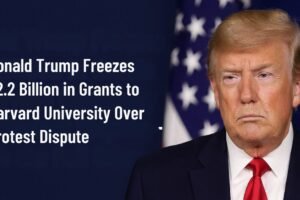
In a bold move that has dramatically reshaped the future of North American diplomacy, Canada’s Prime Minister Mark Carney has declared the end of the country’s traditional close-knit relationship with the United States. This announcement follows U.S. President Donald Trump’s shocking decision to impose a 25% tariff on Canadian automobile imports, a sector that forms the backbone of Canada’s export economy. Carney didn’t mince words, calling the tariff “a very direct attack” on Canada’s economic sovereignty.
During a press conference in Ottawa, the newly appointed Prime Minister emphasized that Canada would no longer operate under outdated economic and defense agreements that favored U.S. interests. “The old relationship we had with the United States, based on deepening integration of our economies and tight security and military cooperation, is over,” Carney stated. His firm tone echoed a broader national sentiment—one that’s calling for more self-reliance and economic independence in the face of growing trade hostilities.
Carney, who replaced Justin Trudeau just a month ago, stood his ground while addressing the media after a high-level meeting with provincial leaders. He explained that while the Trump administration’s next steps remain uncertain, Canadians are not powerless. “What is clear is that we as Canadians have agency. We have power. We are masters in our own home,” he said. “We control our destiny. We can give ourselves much more than any foreign government, including the United States, can ever take away.”
The impact of the U.S. tariff decision is already being felt. Canada’s automotive industry, which employs over 125,000 workers directly and supports around 500,000 more, is under immediate threat. With the U.S. being a key market for Canadian-made vehicles and auto parts, the 25% duty places immense pressure on manufacturers and could trigger a cascade of price hikes, job losses, and production slowdowns. The situation has fueled a surge in online searches like “Trump Canada car tariff update,” “Canada’s response to U.S. trade war,” and “Mark Carney U.S. relationship statement.”
The Prime Minister didn’t immediately announce retaliatory tariffs but confirmed his team is analyzing President Trump’s latest executive order. He also condemned the tariffs as “unjustified” and emphasized that Canada will protect its workers, industries, and economic integrity. While retaliatory measures are being considered, Carney has also hinted at broader long-term strategies—reducing reliance on U.S. trade by building stronger ties with Europe, Asia, and emerging economies.
Interestingly, this isn’t the first blow in what’s now becoming a full-blown economic standoff. Earlier this month, the Trump administration also reinstated a 25% tariff on Canadian steel and aluminum imports, signaling a more aggressive trade policy aimed at reshaping American supply chains. The combination of these measures has escalated tensions between two of the world’s closest trading partners, transforming friendly neighbors into economic adversaries almost overnight.
Economists warn that this could hurt not just Canada but also U.S. consumers, who may soon face rising prices on automobiles and other goods reliant on Canadian inputs. “The North American auto industry is highly interconnected,” said one trade expert. “Disruptions in Canada will undoubtedly lead to shortages and higher prices in the U.S. as well.”
As the dust settles, Canada appears ready to reposition itself on the global trade map. Carney’s administration is expected to ramp up negotiations with the European Union, Japan, India, and BRICS nations, seeking diversified markets and fairer trade frameworks. This strategic pivot is being viewed as an opportunity to future-proof Canada’s economy while asserting its independence on the world stage.
With Carney’s strong words making headlines and his actions setting the tone for a new era, it’s clear that Canada is no longer willing to be a quiet partner in an unequal relationship. “We’re not just reacting,” Carney concluded. “We’re rethinking our entire global trade approach—and this is only the beginning.”
Stay tuned to ibizznews.com for further updates.
Also Read
Roshni Nadar Becomes First Indian Woman to Enter Global Top 10 Richest Women List – Ranked 5th in 2025
Marvel Studios Confirms Star-Studded ‘Avengers Doomsday’ Cast as Production Begins – Everything You Need to Know
March 31 Bank Holiday Update: Will Banks, Income Tax Offices Remain Open on Financial Year-End? Here’s the Latest
ChatGPT’s Ghibli-Style Image Generator Takes the Internet by Storm




